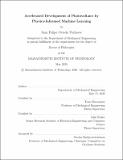Accelerated development of photovoltaics by physics-informed machine learning
Author(s)
Oviedo Perhavec, Juan Felipe.
Download1191718428-MIT.pdf (31.39Mb)
Other Contributors
Massachusetts Institute of Technology. Department of Mechanical Engineering.
Advisor
Tonio Buonassisi and John Fisher.
Terms of use
Metadata
Show full item recordAbstract
Terawatt-scale deployment of photovoltaics (PV) is required to mitigate the most severe effects of climate change. Despite sustained growth in PV installations, technoeconomic models suggest that further technical advances and cost reduction are required to enable a timely energy transition in the next 10 - 15 years. This limited timeline is incompatible with the historic rate of materials development: solar cell technologies have taken decades to transition from the laboratory to large-scale commercial applications. Recently, the convergence of high-performance computing, high-throughput experimentation and machine learning has shown great promise to accelerate scientific research. In this context, this thesis proposes and demonstrates a comprehensive methodology for accelerated PV development. Machine learning constitutes a key component of the new framework, effectively reconciling the formerly disjoint aspects of first-principles simulation, experimental fabrication and in-depth characterization. This integration is achieved by judiciously formalizing material science problems, and developing and adapting algorithms according to physical principles. Under this interdisciplinary perspective, the physics-informed machine learning approach allows a 3 - 30x acceleration in various aspects of PV development. This work focuses in two particular areas. The first thrust aims to accelerate the screening and optimization of early-stage PV absorbers. The high-dimensionality of the material space, and the sparsity of experimental information, make early-stage material development challenging. First, I address the structural characterization bottleneck in material screening using deep learning techniques and physics-inspired data augmentation. Then, I develop a physics-constrained Bayesian optimization algorithm to efficiently optimize material compositions, fusing experimentation and density functional theory with stochastic constraints. These advancements lead to the discovery of several promising lead-free perovskites, and a 3x more stable multication lead halide perovskite. The second thrust aims to accelerate the industrial transition of more mature PV devices. For this purpose, I reformulate the traditional record-efficiency figure of merit to include probabilistic and manufacturing considerations, allowing industrially-relevant optimization. Then, a scalable physical inference algorithm is developed by a principled combination of Bayesian inference, deep learning and physical models. This inference model efficiently provides physical insights leading to > 3x faster solar cell optimization. Finally, this approach is expanded to solar cell degradation diagnosis. I reduce the characterization time by > 5x using time-series forecasting methods. Then, the scalable inference model is combined with a game-theoretic interpretability algorithm to elucidate physical factors driving degradation. Together, these methodology and results can dramatically accelerate PV technology development, and have a timely impact in climate change. The physics-informed models expand the horizon of applied machine learning, and the fundamental approach of this work is applicable to other energy materials and systems, such as thermoelectrics and batteries.
Description
Thesis: Ph. D., Massachusetts Institute of Technology, Department of Mechanical Engineering, May, 2020 Cataloged from the official PDF of thesis. Includes bibliographical references (pages 179-194).
Date issued
2020Department
Massachusetts Institute of Technology. Department of Mechanical EngineeringPublisher
Massachusetts Institute of Technology
Keywords
Mechanical Engineering.